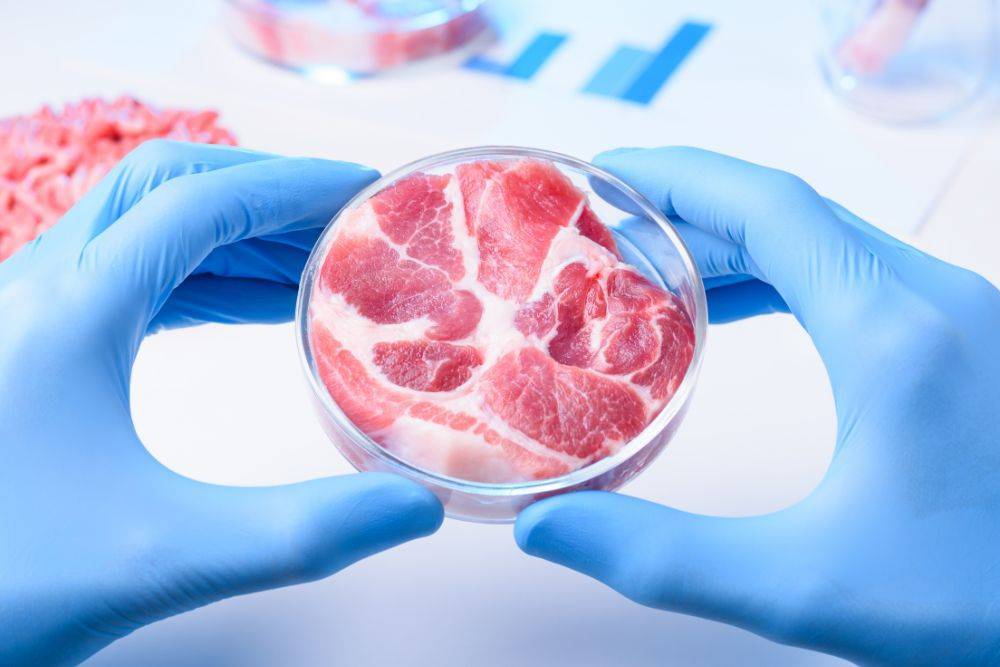With the growth of the lab-grown meat industry in Singapore, it is important to consider: What are the health benefits compared to conventional meat reared from livestock?
Background about Lab-Grown Meat
Lab-grown meat, also known as designer, cultivated, or cell-based meat, uses biotechnology to genetically engineer real meat directly from animal cells.
It was first created in 2013 by Mark Post, a researcher at the public research university in the Netherlands, the University of Maastricht. At that time, one hamburger using lab-grown meat cost $320,000 to create.
Lab-Grown Meat in Singapore
Singapore is a small nation vulnerable to supply chain disruptions. To address its food security needs, it is interested in alternative food sources such as lab-grown products.
While some countries raise food safety concerns about lab-grown meat, in December 2020, Singapore introduced strict measures for the safety assessment of lab-grown meat and became the first country in the world to get the national food safety authorities’ approval for the sale of lab-grown meat to consumers.
General Benefits of Lab-Grown Meat
Lab-grown meat is more sustainable than conventional options. The livestock industry is not sustainable. Raising livestock for human consumption generates nearly 15% of greenhouse gas emissions—higher than all transportation emissions combined! It also takes up nearly 70% of agricultural land, contributing to deforestation and loss of biodiversity.
Thus, as food demands increase with the increasing population worldwide, consuming lab-grown meat will be a boon to the environment.
Furthermore, lab-grown meat is cruelty-free as it does not involve killing animals.
Health Benefits of Lab-Grown Meat
Enhanced nutritional profile
Lab-grown meat producers can enhance the nutritional profile of the meat by adjusting the medium in which the living cells are grown to replace saturated and unhealthy fats and cholesterol with vitamins, nutrients, and healthy and essential fats.
Free from growth hormones
Growth hormones in meat have been linked to health risks in humans, such as reproductive problems, developmental problems in children, and endocrine disruption (disruption of the system that produces and releases hormones). Lab-grown meat is said to be healthier than conventional options as it is free from growth hormones and antibiotics often injected into farm animals to improve their product, avoid disease, and promote growth.
Reduced chance of contamination
Conventional meat contains antibiotic-resistant bacteria that enter our general microbial environment. Because cultivating lab-grown meat is much more controlled than traditional agriculture, there is less chance of contamination and foodborne diseases. The decrease in contact with animals and the use of their habitats also lowers the risk of more viruses being spread from animals to humans.
Health Considerations of Lab-Grown Meat
Although it holds promise for a healthier and more sustainable future of food production, rigorous research and regulatory oversight are critical to ensure its safety. Scientists will need to address the potential health concerns.
Unknown Long-Term Health Impacts
As a novel food technology, its long-term health effects of regular consumption are not yet fully understood. Research into any potential impacts on metabolism, gut health, immune responses, or overall health outcomes over extended periods of time will be crucial as the industry develops.
Unknown Nutrient Profile
Cultured meat might lack certain nutrients naturally present in traditionally raised meat, such as naturally occurring nutrients like omega-3 fatty acids if not specifically added during the production process. Further research is needed to fully understand and optimise the nutrient profile to ensure it meets dietary requirements. Ensuring a comprehensive nutrient profile in lab-grown meat products will be essential to avoid deficiencies in consumers’ diets.
Unknown Additives
Depending on production methods, this meat may include additives or processing aids. These could be considered less desirable for health-conscious consumers. The growth mediums used to cultivate meat may contain unknown substances that could have unintended health consequences. Transparency and comprehensive labelling will be essential to inform consumers about any additives used and ensure informed dietary choices.
Conclusion
Lab-grown meat is a topic of great interest and research in Singapore. It is a growing competitor in the commodity meat market. Companies continue to research developing whole cuts of meat using 3-dimensional printing and bioengineering technology. Compared to conventional meat, it has benefits. They include an enhanced nutritional profile, the absence of growth hormones, and a reduced chance of contamination. However, continued scientific inquiry and regulatory diligence will be essential to ensure that the potential benefits of this technology are realised while safeguarding public health.
Have a pressing question for a doctor? Medical Channel Asia has launched a community forum page where you can get questions answered by a medical specialist. Visit the community forum here.

